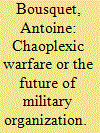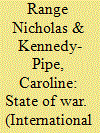|
|
|
Sort Order |
|
|
|
Items / Page
|
|
|
|
|
|
|
| Srl | Item |
| 1 |
ID:
084303


|
|
|
|
|
| Publication |
2008.
|
| Summary/Abstract |
Scientific methods and concepts have been exerting a powerful influence on the exercising of armed force since the Scientific Revolution and the dawn of the modern era. In association with the respective technologies of the clock, engine and computer, the scientific theories of mechanism, thermodynamics, and cybernetics have all in turn been recruited to shape distinct approaches to the challenges of imposing order on the chaos of the battlefield. Today, it is on the basis of the new sciences of chaos and complexity that the latest regime of the scientific way of warfare is being erected. Chaoplexic warfare draws on the study of nonlinear phenomena of self-organization to propose a radical decentralization of armed forces through the adoption of the network form. For all its present flaws, network-centric warfare and its operational concepts of self-synchronization and swarming mark an important step on the path to chaoplexic warfare.
|
|
|
|
|
|
|
|
|
|
|
|
|
|
|
|
| 2 |
ID:
084307


|
|
|
|
|
| Publication |
2008.
|
| Summary/Abstract |
The requirement of legitimate authority, though central to medieval and modern interpretations of the just war tradition, has received less attention in the contemporary literature than the other requirements of jus ad bellum. The usual interpretation holds that the kind of entities that have legitimate authority are states, coalitions of states, supranational institutions or national liberation movements and that these political entities are endowed with the authority to wage war. At the same time, contemporary literature on the ethics of international relations is characterized by a revival of the cosmopolitan tradition. This subjects states and quasi-states to stringent legitimacy conditions: according to cosmopolitans, states are internally legitimate-have the right to coerce their own members-if, and only if, they respect the latter's fundamental human rights. The principle of legitimate authority has been criticized in some recent writings on war for not taking account of the implications of (independently defended) cosmopolitan descriptions of state legitimacy. If states are subject to stringent legitimacy conditions such as those outlined above, the criticism goes, they do not possess the right to wage war simply by virtue of their being a state. Rather, the authority to resort to war should be vested in supra-national institutions as well as, or indeed, rather than, states. In this sense war becomes a mechanism for enforcing cosmopolitan moral norms, as opposed to a mechanism for resolving interstate disputes. This cosmopolitan account of legitimate authority needs to be developed to include supra-national institutions. While the author does not deny that such institutions have the moral and legal right to wage war, the aim of this article is to cast doubt on the cogency of the requirement of legitimate authority itself-on cosmopolitan grounds. From a cosmopolitan point of view, the article argues there are very good reasons for dropping the requirement altogether. After sketching out a plausible cosmopolitan account of justice in section two, section three shows that a war need not be waged by a legitimate authority in order to qualify as a just war.
|
|
|
|
|
|
|
|
|
|
|
|
|
|
|
|
| 3 |
ID:
084304


|
|
|
|
|
| Publication |
2008.
|
| Summary/Abstract |
As the global war on terror bogged down in Iraq and Afghanistan, a new inter-and intra-service struggle emerged within the military, between what we might call the 'transformationists' and the 'neotraditionalists'. The transformationists put their faith in network-centric warfare and precision munitions to resolve the intractable political, civil and religious conflicts of the twenty-first century. The neotraditionalists, in contrast, go back to the future for lessons, to the 'low-intensity conflicts' of Malaya and Vietnam, the 'small wars' that Marines fought in Central America in the interwar period, and even the instructions given to American servicemen deployed to assist the British occupation of Iraq during the Second World War. Lumped together under the rubric of 'irregular warfare', two new watchwords have had emerged from the neotraditionalist camp: 'counter-insurgency' and 'cultural awareness'. As the neotraditionalists reach out to social scientists to assist them in their efforts, a secondary civil war has erupted in the universities over whether academics should become involved in the new war efforts. Based on a week spent embedded with the 1/25th Marines at 29 Palms and extensive interviews with key proponents and critics, this article maps (and reflexively questions the practice of mapping) the future of warfare as it is planned, taught, gamed and operationalized by the US military.
|
|
|
|
|
|
|
|
|
|
|
|
|
|
|
|
| 4 |
ID:
084309


|
|
|
|
|
| Summary/Abstract |
This article evaluates recent literatures within International Relations on so-called 'private force'. It suggests that the conceptual weaknesses of much of this literature can be accounted for, in part, by a misunderstanding of the historical and sociological importance of the way power is organized and legitimated through shifts in the public-private distinction. This distinction is one of the primary mechanisms, if not the primary mechanism, for organizing political, economic and, therefore, military power. For the sake of historical accuracy and conceptual integrity scholars should abandon the terminology of 'public' and 'private' force. Tracing how public-private distinctions shift and change as an effect of political power is a joint task for historical sociology and international political theory
|
|
|
|
|
|
|
|
|
|
|
|
|
|
|
|
| 5 |
ID:
084305


|
|
|
|
|
| Publication |
2008.
|
| Summary/Abstract |
Over the last decade or so, growing attention has been paid to notions of preventive war. The most notorious case is the approach adopted by the Bush administration after the 9/11 attacks, but there has been a much wider debate. This article traces the lineaments of that debate, and the advocacy of a legitimate doctrine of preventive war, by those who are normally seen-rightly-as defenders of the rule of law and the just war tradition. This article argues that such attempts to justify some notions of preventive war are profoundly problematic and the attempt to make them fit within the rubric of the just war tradition is doomed to failure and potentially very damaging for the coherence of the tradition as an approach to the restraint of war.
|
|
|
|
|
|
|
|
|
|
|
|
|
|
|
|
| 6 |
ID:
084311


|
|
|
|
|
| Publication |
2008.
|
| Summary/Abstract |
This article examines the justifications made for war by President Bush in Afghanistan and Iraq, cataloguing all the administration's statements that justify or support these wars. These discourses reveal a radical departure from the post-1990 trend of United States presidents, with international law and human rights being almost absent. The justifications point to a hegemonic US attempting to establish itself as the guarantor and provider of freedom and peace, attempting to establish a hierarchically structured international society.
|
|
|
|
|
|
|
|
|
|
|
|
|
|
|
|
| 7 |
ID:
084299


|
|
|
|
|
| Publication |
2008.
|
| Summary/Abstract |
This article frames the discussion of the 'state of war' in this issue of International Affairs. Beginning by noting the continued recurrence of 'traditional' modes of war along side so-called 'new wars' and calling to aid Rousseau's brutal satire of 1756, The state of war, the article offers a discussion of three 'responses' to the reality of war in international relations-the heroic response, the realpolitik response and the compassionate response-and argues that a synthesis between them characterizes the general approach to war in any historical period. It then considers how the contemporary synthesis might be viewed and offers thoughts on the articles in this issue in the light of this suggestion.
|
|
|
|
|
|
|
|
|
|
|
|
|
|
|
|
| 8 |
ID:
084301


|
|
|
|
|
| Publication |
2008.
|
| Summary/Abstract |
Meme theory has been attracting much attention in recent years. Pioneered by Richard Dawkins and Daniel Dennett it suggests that there are self-replicating units of culture analogous to genes. Like genes these 'memes' seek to copy themselves as widely as possible. One of them may be war. Memetics remains in its infancy but the truly sobering aspect is that 'fitness of purpose' for a meme may have little to do with the biological fitness of the people who are 'programmed' by it; it simply evolves because it is advantageous for itself. Memes also persist because they flourish in the presence of other memes (such as religion) in what Dawkins calls 'memeplexes'. One of the most persistent memes is honour, and another is revenge for dishonour imagined or real. War is a powerful medium for both. Even if meme theory never catches on it encourages us to think about war more creatively.
|
|
|
|
|
|
|
|
|
|
|
|
|
|
|
|
|
|
|
|
|